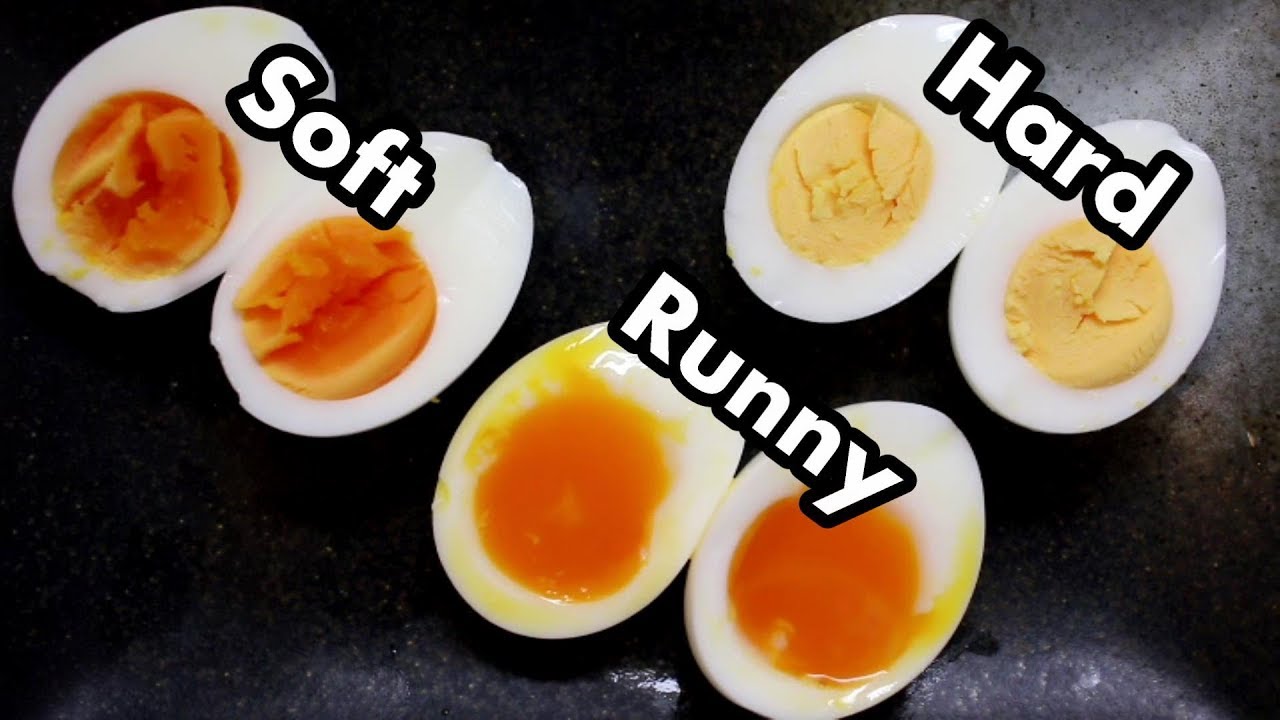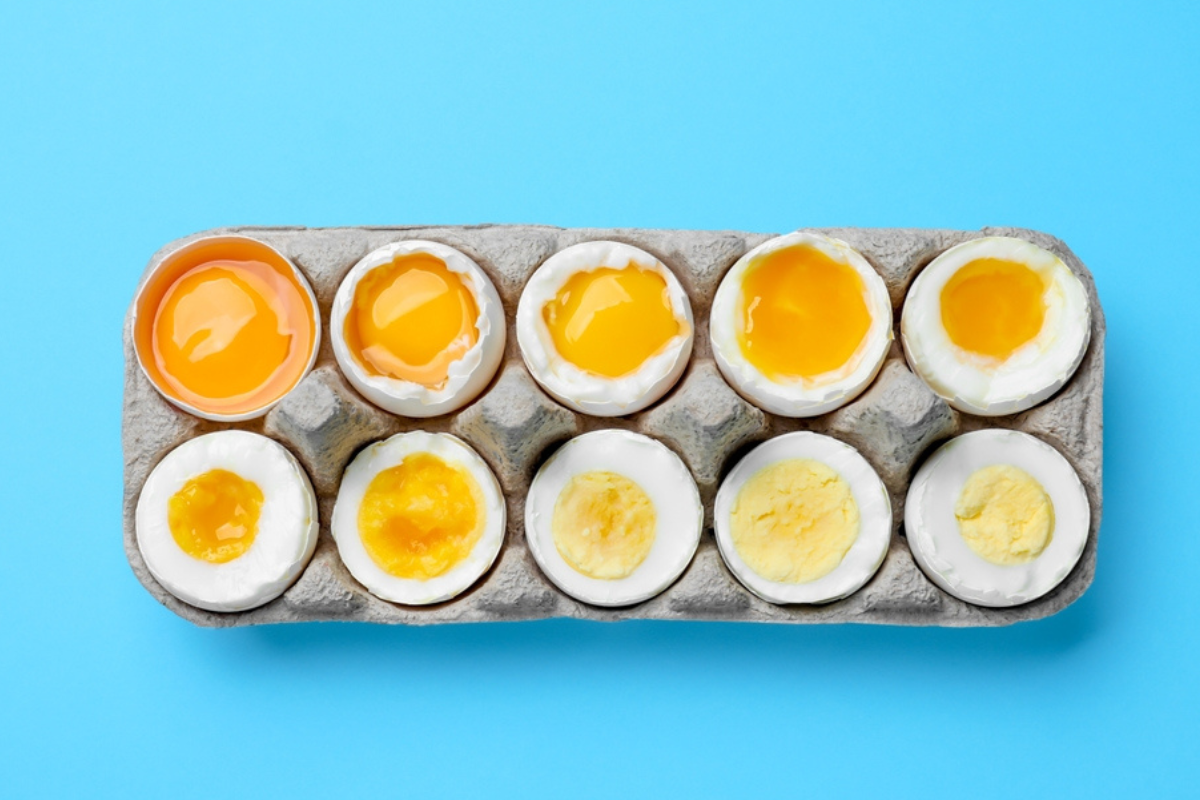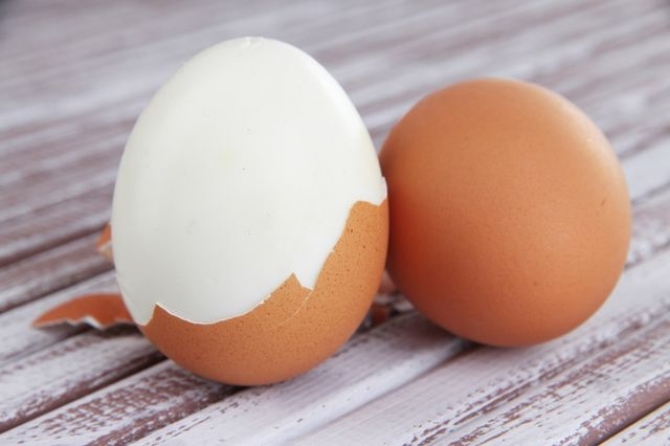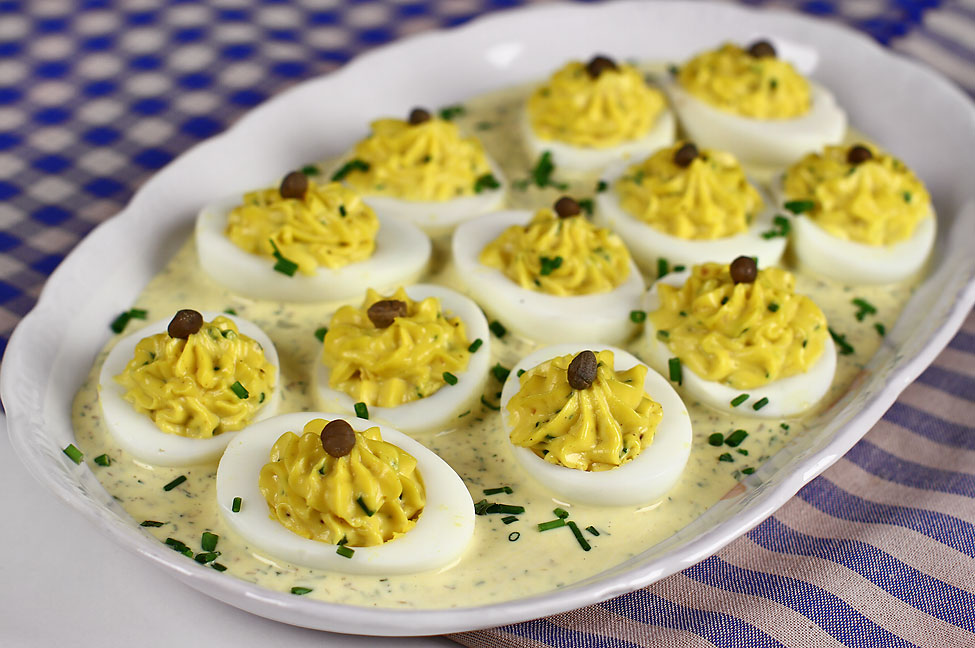Discover How Long To Boil Eggs To Enjoy Them With Pleasure
What makes an ideal boiled egg? How long to boil eggs? No matter what pot you use or how powerful or weak your stove is, this procedure will consistently deliver the amount of doneness you want. The yolks are cooked but still creamy, and the whites are firm but not rubbery. The major issue with boiling eggs is that people often overcook them, which results in a dark green colour around the yolk and a slightly sulphurous flavour. Are your eggs ready then? Great. Here's how to consistently produce hard-boiled eggs that are flawless.
Author:Buttskin FamilyReviewer:Caden SteelheartOct 05, 2023506 Shares46K Views
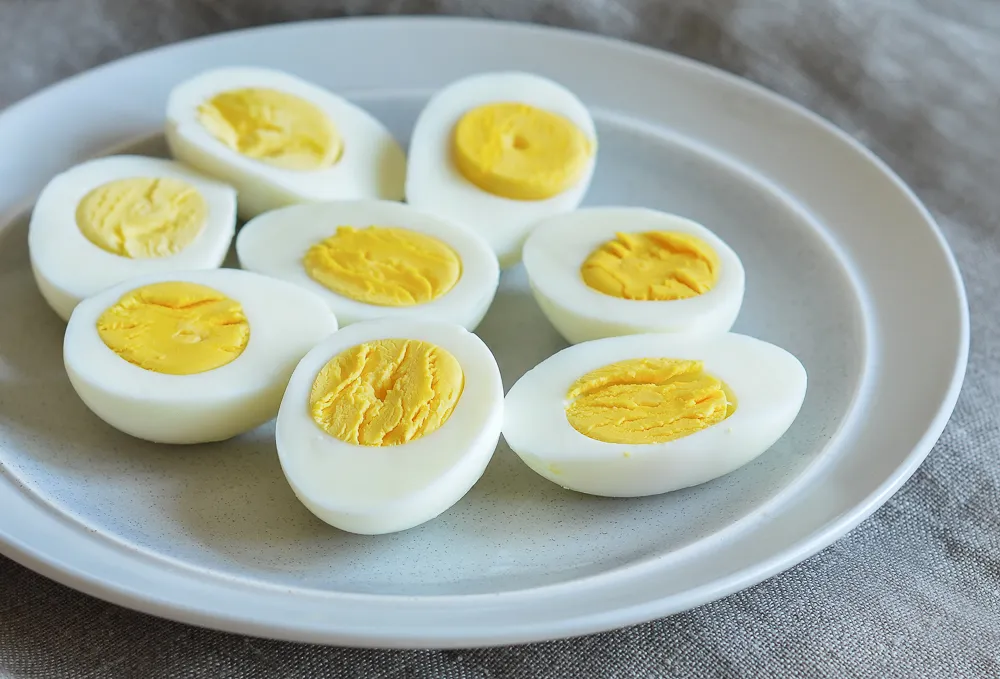
What makes an ideal boiled egg? How long to boil eggs? No matter what pot you use or how powerful or weak your stove is, this procedure will consistently deliver the amount of doneness you want. The yolks are cooked but still creamy, and the whites are firm but not rubbery. The major issue with boiling eggs is that people often overcook them, which results in a dark green colour around the yolk and a slightly sulphurous flavour. Are your eggs ready then? Great. Here's how to consistently produce hard-boiled eggs that are flawless.
Types Of Boiled Eggs
Before we delve into the timing, let's clarify the various types of boiled eggs and what sets them apart:
- Soft-Boiled Eggs -Soft-boiled eggs have a runny yolk and a just-set egg white. They are typically served in an egg cup, and you use a spoon to dip into the yolk.
- Medium-Boiled Eggs -Medium-boiled eggs have a yolk that is still somewhat creamy but not entirely runny, and the egg white is fully set.
- Hard-Boiled Eggs -Hard-boiled Eggs Have A Fully Set Yolk And Egg White. They Are Perfect For Slicing And Using In Salads, Sandwiches, Or As A Snack.
Bring A Large Pot Of Water To A Boil
On your hob, bring a big pot of water to a boil. (Also, you simply need water. Salting the water or adding baking soda is a requirement in certain recipes, but these steps are entirely optional and, quite frankly, unneeded.) Make sure you provide enough water to thoroughly submerge all of your eggs.
Eggs that aren't fully immersed will cook in different ways. You may have heard that you should start the eggs in cold or room temperature water, raise it to a boil, and then remove them from the heat. This is untrue. Our testing show that beginning with hot water results in easier-peeling eggs, so always start with boiling your water.
Gently Lower The Eggs Into The Water
Use a big spoon to drop the eggs into the boiling water after it has reached a rolling boil. (If the eggs are dropped into the pot carelessly, they may break and end up in the water with egg whites floating on top.) Oh, and if you can, start with cold eggs from the fridge since it will be simpler to peel the end product.
Lower The Heat Slightly And Boil For 8 To 14 Minutes
To prevent the eggs from bouncing about in the pan during cooking, reduce the high heat to a simmer if the water is still at a full boil. Once the eggs are cooked to the appropriate doneness, set a timer. Despite being soft-boiled (the sort you scoop straight out of the shell), cooked eggs may be consumed in as little as 4 minutes.
They will be hard-boiled after 8 minutes, but those who like drier hard-boiled eggs may continue cooking them for an additional 14 minutes. To determine your preferred degree of doneness, use the chart of cooking times below and some experimentation.
How Long To Boil Eggs
- 4 minutes -Ramen-style, jammy soft-boiled eggs
- 5 minutes -firm white eggs with runny yolk
- 6 minutes -firm white eggs with gooey yolk
- 8 minutes -firm white eggs with fully set yolk, but still sort of gooey and golden
- 10 minutes -firm white eggs with a firmer pale yolk, with just a bit softness in the middle
- 12 minutes -firm white eggs with an almost completely hard-boiled yolk
- 14 minutes - firm white eggs with a completely hard-boiled crumbly and dry pale yolk.
Transfer The Eggs To An Ice Water Bath
When the timer goes off, remove the eggs from the boiling water and place them in a large dish of icy water using a slotted spoon. The ice bath will prevent the egg from overcooking, guaranteeing that it will be just as you want it, and it will also make the eggs simpler to peel.
Peel The Eggs
Peel your eggs under cold, running water once they are cool enough to handle. The water will seep below the egg shell, assisting you in carefully lifting it off. (It also makes sure that any little bits of shell that may have remained on the eggs are removed.) Eggs may also be peeled immediately in the dish as an alternative. Once the eggs have cooled for a few minutes, you may jiggle them with a spoon.
Allowing them to rattle and have their shells shatter will allow you to begin peeling them. Although you use less water this way, the shells won't rinse out as easily as they would under running water. Whether shelled or unshelled, hard-boiled eggs may be stored in your refrigeratorfor up to a week. In an airtight container, keep them. Eat your eggs now that they are prepared!
Of course, you can eat them on their own, but you can also add them to spaghetti, salads, sandwiches, casseroles, and grain bowls. Do you still need motivation? Check out the greatest hard-boiled egg recipes; if these suggestions don't motivate you to master the art of flawless egg boiling, nothing will. Discovermore egg info, including nutrition and safety tips, additional cooking methods, egg recipes, and more.
Tips For Boiling Eggs
Boiling eggs might seem like a simple task, but there are a few tips and tricks that can help you achieve perfectly boiled eggs every time. Whether you're aiming for soft, medium, or hard-boiled eggs, here are some valuable tips to keep in mind:
- Use Fresh Eggs -While slightly older eggs are often easier to peel after boiling, it's still best to start with fresh eggs. The fresher the eggs, the better the flavor and texture.
- Room Temperature Eggs -Allow your eggs to come to room temperature before boiling. This helps prevent cracking when they're placed in hot water.
- Choose the Right Pot -Use a saucepan or pot large enough to hold your eggs in a single layer. Overcrowding can lead to uneven cooking.
- Cold Start -Place your eggs in the pot and cover them with cold water. Starting with cold water helps prevent the eggs from cracking as they heat up gradually.
- Exact Water Level -Ensure that there is enough water in the pot to cover the eggs by about an inch. This helps the eggs cook evenly.
- Add a Pinch of Salt -Adding a pinch of salt to the water can make the eggs easier to peel and can also help prevent cracking.
- Boil Gently -Bring the water to a boil over medium-high heat. Once it's boiling, reduce the heat to maintain a gentle simmer. Vigorous boiling can lead to cracked eggs.
- Use a Timer -Accurate timing is crucial for achieving the desired consistency. Use a kitchen timer or a smartphone app to keep track of the cooking time.
- Soft, Medium, or Hard-Boiled -Know your desired outcome and adjust the cooking time accordingly. Soft-boiled eggs usually require about 4-6 minutes, medium-boiled eggs around 7-9 minutes, and hard-boiled eggs between 9-12 minutes.
- Ice-Water Bath -After the eggs have finished cooking, immediately transfer them to a bowl of ice water. This helps stop the cooking process and makes the eggs easier to peel.
- Crack and Peel Carefully -To peel your eggs, gently crack the shell all over by rolling it on a countertop, then peel under running water to help remove any small shell fragments.
- Storage -If you don't plan to eat your boiled eggs right away, store them in the refrigerator with their shells on. They can be kept for several days in the fridge.
- Labeling -If you're boiling a mix of soft, medium, and hard-boiled eggs, consider labeling them to avoid confusion.
- Experiment - Don't be afraid to experiment with timing to achieve your perfect boiled egg. Everyone's preference varies, so adjust the cooking time to match your taste.
- Enjoy -Once you've mastered boiling eggs, you can enjoy them in various dishes, from salads to sandwiches, or simply as a quick and nutritious snack.
Creative Egg Dishes
Eggs are incredibly versatile and can be used to create a wide array of creative and delicious dishes. Whether you're looking for breakfast, brunch, lunch, or dinner options, eggs can be the star of the show. Here are some creative egg dishes to inspire your culinary adventures:
- Eggs Benedict Variations -Eggs Benedict is a classic brunch favorite, but you can get creative by experimenting with different variations. Try substituting the traditional Canadian bacon with smoked salmon for Eggs Royale or using sautéed spinach and mushrooms for a vegetarian twist.
- Shakshuka -This Middle Eastern and North African dish features poached eggs in a spicy tomato and pepper sauce. It's perfect for a hearty breakfast or brunch, especially when served with crusty bread for dipping.
- Frittata -Frittatas are like an Italian version of an omelet, and they're incredibly versatile. You can load them up with various ingredients like cheese, vegetables, herbs, and even leftover meats. Frittatas can be served hot or at room temperature, making them great for picnics or potlucks.
- Egg Curry -If you're a fan of Indian cuisine, try making egg curry. Hard-boiled eggs are simmered in a flavorful tomato-based curry sauce with spices like cumin, coriander, and turmeric.
- Cloud Eggs -These whimsical eggs are a visual delight. To make cloud eggs, separate the egg whites and yolks, whip the whites until fluffy, create a nest, and then gently place the yolks in the center. Bake until the whites are golden brown for a unique presentation.
- Egg Drop Soup -A staple in Chinese cuisine, egg drop soup is a comforting and simple dish. It involves gently whisking beaten eggs into hot chicken or vegetable broth, resulting in silky ribbons of cooked egg throughout the soup.
- Quiche -Quiche is a savory pie made with a creamy egg filling. You can customize it with various ingredients like bacon, spinach, cheese, and mushrooms. Quiche is great for brunch or a light dinner when paired with a salad.
- Egg Salad with a Twist -Give traditional egg salad a twist by adding ingredients like diced avocado, smoked salmon, capers, or curry powder. Serve it on sandwiches, crackers, or lettuce wraps.
- Ramen with Soft-Boiled Egg -Upgrade your ramen by adding a perfectly soft-boiled egg. The creamy yolk blends beautifully with the savory broth, creating a luxurious and satisfying bowl of noodles.
- Spanish Tortilla (Tortilla Española) -This Spanish omelet features layers of thinly sliced potatoes and onions bound together with eggs. It's typically served in wedges and makes for a delightful tapas dish.
- Egg Tacos -Start your day with a twist on traditional breakfast tacos. Scramble or fry eggs and fill soft tortillas with ingredients like black beans, salsa, avocado, and cheese.
- Egg-Stuffed Peppers -Cut the tops off bell peppers, remove the seeds, and crack an egg into each one. Bake until the eggs are set and the peppers are tender. You can add cheese, herbs, or diced vegetables for extra flavor.
Frequently Asked Questions
How To Store Hard Boiled Eggs?
Hard-boiled eggs may be kept in their shells for up to a week in the refrigerator. The shell will aid in limiting the cooked white's ability to absorb refrigerator odors. Hard-boiled eggs that have previously been peeled may be kept for up to a week in an airtight container with a wet paper towel. Every day, change the moist towel.
How Long Do Hard Boiled Eggs Last In The Fridge?
Hard-boiled eggs may be kept for a week to seven days if they are properly stored in the refrigerator. Keep your cooked eggs in their shells until you're ready to eat them for optimal results.
Can I Use An Egg Timer For Boiling Eggs?
Yes, you can use an egg timer or a kitchen timer to ensure precise boiling times for your eggs. It's a convenient way to avoid overcooking or undercooking.
What's The Benefit Of Adding Salt When Boiling Eggs?
Adding a pinch of salt to the water when boiling eggs can make them easier to peel and can help prevent cracking during cooking. It's a simple but effective trick.
Is It Better To Peel Boiled Eggs Under Running Water?
Yes, peeling boiled eggs under running water can help remove any small shell fragments more easily. It's a useful technique to ensure clean and smooth peeling.
Final Words
In conclusion, boiling eggs to perfection is all about understanding your desired level of doneness and following some essential techniques. Whether you prefer your eggs soft-boiled with a runny yolk, medium-boiled with a creamy center, or hard-boiled with a fully set yolk, the key is to start with fresh eggs, maintain the right temperature, and use precise timing.
Using an egg timer, adding a pinch of salt to the water, and peeling the eggs under running water are all helpful tips to achieve consistently excellent results. With a bit of practice and these valuable insights, you'll soon master the art of boiling eggs and enjoy them in various dishes or as a quick and nutritious snack.
Jump to

Buttskin Family
Author
The Buttskins are a crazy author family who love writing, laughter, and eating an unhealthy amount of junk food. Mom Rockita started scribbling stories as soon as she could hold a pen, and Dad John didn't realize authoring children's books was a real job until after they were married.
Their kids have embraced storytelling at an early age. Little Lucy, age 5, dictates her colorful tales about dragons and princesses to her parents. Her 8-year old brother Jake collects scraps of paper to diagram his latest imaginary adventure involving ninjas and dinosaurs.

Caden Steelheart
Reviewer
Caden Steelheart, an enigmatic author, weaves tales that immerse readers in the depths of sin city's underbelly. With his words as a weapon, he crafts literary masterpieces that reflect the dark and dangerous spirit of the city. Caden's writing captures the gritty essence of sin city, delving into the intricacies of its characters and the moral complexities that define their existence.
Born amidst the shadows, Caden draws inspiration from the relentless chaos and unforgiving nature of the city. His words carry the weight of experience, creating a vivid and haunting portrayal of sin city's undercurrents. Through his stories, he explores the blurred lines between right and wrong, exploring themes of power, deception, and redemption.
Caden Steelheart's literary prowess has made him a name whispered in literary circles, captivating readers with his ability to immerse them in sin city's intricately woven tapestry. With each written word, he invites readers to journey into the darker realms of the human experience, offering them a glimpse into the secrets and sins that shape the city's inhabitants. Caden Steelheart, a master of capturing the essence of sin city through his writing, continues to captivate audiences with his haunting and evocative narratives.
Latest Articles
Popular Articles
